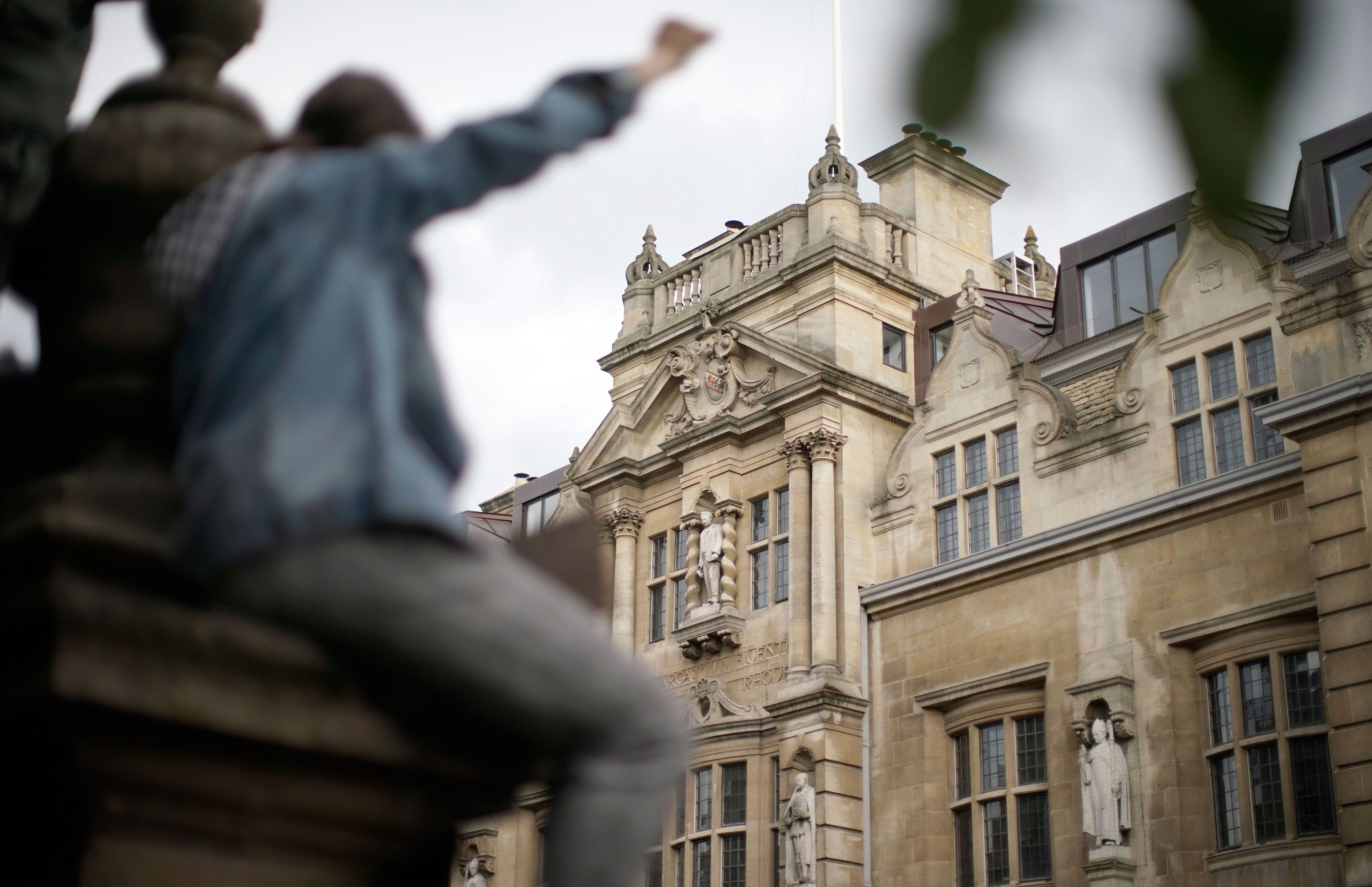Should Britain topple slavery-linked statues?
Cecil Rhodes and even William Gladstone may share Edward Colston’s fate

A free daily email with the biggest news stories of the day – and the best features from TheWeek.com
You are now subscribed
Your newsletter sign-up was successful
When a statue of 17th century slave-trader Edward Colston was dragged from its plinth on Sunday, the manner of its removal was criticised more than the motives of the protesters who carried out the act.
Conservative MP Caroline Nokes voiced the feelings of many in saying that while she had no quarrel with Colston’s “terribly symbolic” tumbling into Bristol Harbour, a more orderly approach would have been preferable.
“If we’re going to remove these historic artefacts then we should do it carefully,” she told ITV’s Good Morning Britain. “We should have a discussion about what happens to them next, how can we continue to learn from that history.”
The Week
Escape your echo chamber. Get the facts behind the news, plus analysis from multiple perspectives.

Sign up for The Week's Free Newsletters
From our morning news briefing to a weekly Good News Newsletter, get the best of The Week delivered directly to your inbox.
From our morning news briefing to a weekly Good News Newsletter, get the best of The Week delivered directly to your inbox.
Now, that discussion is in full swing.
More than 100 Labour councils have pledged to review the “appropriateness” of monuments in their areas, with London Mayor Sadiq Khan launching a “diversity commission” in the capital. And local Conservative leaders are under growing pressure to follow their lead.
Meanwhile, Black Lives Matter protesters have drawn up a “target list” of 60 statues across the UK, on a Topple the Racists website, the Daily Mail reports.
“Among them are leaders who held undeniably racist views and others who performed evil acts against people of colour,” says the newspaper. “But others also played a leading role shaping the cities and institutions that form modern-day Britain.”
A free daily email with the biggest news stories of the day – and the best features from TheWeek.com
For Alex Massie in The Times, the stumbling block is that there are “so many candidates” for removal. “Our great cities are stuffed with monuments to imperial conquest and many of our finest streets were built from the proceeds of exploitation and misery,” he points out.
Despite the toppling of Colston’s statue, the former slave trader “still has a significant presence” in Bristol, where “several buildings, schools and organisations are named after him”, says The Voice’s Vic Motune.
Yet total erasure is no solution, says Massie.
“Tear it down completely and you wipe it from the record,” he argues. Instead, we should build a “long overdue” Museum of Empire, to provide a new home for old statues, and an “unflinching yet dispassionate” look at Britain’s imperial past.
Historian David Olusoga agrees. A public monument says “this man was a great man who did great things”, he told the BBC. Statues like those of Colston should now be “put in a museum which is where, after all, we remember history properly”.
–––––––––––––––––––––––––––––––For a round-up of the most important stories from around the world - and a concise, refreshing and balanced take on the week’s news agenda - try The Week magazine. Start your trial subscription today –––––––––––––––––––––––––––––––
Three monumental arguments
Robert Milligan
A statue of Milligan, “who owned two sugar plantations and 526 slaves in Jamaica” when he died in 1809, was removed from outside the Museum of London Docklands building on Tuesday, the BBC reports.
Museum bosses said the monument was “part of the ongoing problematic regime of white-washing history, which disregards the pain of those who are still wrestling with the remnants of the crimes Milligan committed against humanity”.
However, the removal has proved controversial, with critics calling for a boycott of Sainsbury’s, following reports that the supermarket chain funds the museum and “was responsible for the decision” to axe Milligan, says the London Evening Standard.
Cecil Rhodes
Oxford University’s Oriel College is resisting renewed demands to take down a statue of imperialist Rhodes (pictured above), who has long been a target of campaigners. As prime minister of the Cape Colony in what is now South Africa, Rhodes presided over an explicitly racist government.
Oxford City Council has now written to the university “inviting” it to apply for permission to get rid of the statue. And on Tuesday night, “about 1,000 people gathered outside the college to demand its removal”, The Times reports.
But Oxford vice-chancellor Chris Patten has defended the monument. “If it’s good enough for [Nelson] Mandela, it’s good enough for me,” he told BBC Radio 4’s Today programme.
In 2003, the first post-apartheid president of South Africa merged his charitable activities with those of Rhodes’ estate to form the Mandela Rhodes Foundation. It was, Mandela said, “a symbolic moment in the closing of the historic circle”.
William Gladstone
Liverpool University yesterday removed the name of 19th century PM Gladstone from a student halls of residence.
Although “Gladstone is best known for his support for free trade and for home rule for Ireland”, his merchant father owned 2,500 slaves at the time of abolition in 1833, reports the Liverpool Echo.
In a letter to the university’s vice-chancellor, students said that the former British leader’s “views on slavery followed in continuity with the views of his father”.
However, The Guardian writer Patrick Wintour insists that Gladstone’s attitudes to slavery evolved. “By 1850 he said slave trade was by far the foulest crime that taints the history of mankind,” Wintour tweeted on Tuesday night.
The late Liberal statesman has also found an ally in Conservative MP Bim Afolami, who said the renaming decision was “completely nuts”.
-
 Local elections 2026: where are they and who is expected to win?
Local elections 2026: where are they and who is expected to win?The Explainer Labour is braced for heavy losses and U-turn on postponing some council elections hasn’t helped the party’s prospects
-
 How corrupt is the UK?
How corrupt is the UK?The Explainer Decline in standards ‘risks becoming a defining feature of our political culture’ as Britain falls to lowest ever score on global index
-
 ‘The West needs people’
‘The West needs people’Instant Opinion Opinion, comment and editorials of the day
-
 The high street: Britain’s next political battleground?
The high street: Britain’s next political battleground?In the Spotlight Mass closure of shops and influx of organised crime are fuelling voter anger, and offer an opening for Reform UK
-
 Is a Reform-Tory pact becoming more likely?
Is a Reform-Tory pact becoming more likely?Today’s Big Question Nigel Farage’s party is ahead in the polls but still falls well short of a Commons majority, while Conservatives are still losing MPs to Reform
-
 Nigel Farage: was he a teenage racist?
Nigel Farage: was he a teenage racist?Talking Point Farage’s denials have been ‘slippery’, but should claims from Reform leader’s schooldays be on the news agenda?
-
 The ‘Kavanaugh stop’
The ‘Kavanaugh stop’Feature Activists say a Supreme Court ruling has given federal agents a green light to racially profile Latinos
-
 Should TV adverts reflect the nation?
Should TV adverts reflect the nation?Talking Point Reform MP Sarah Pochin’s controversial comments on black and Asian actors in adverts expose a real divide on race and representation


